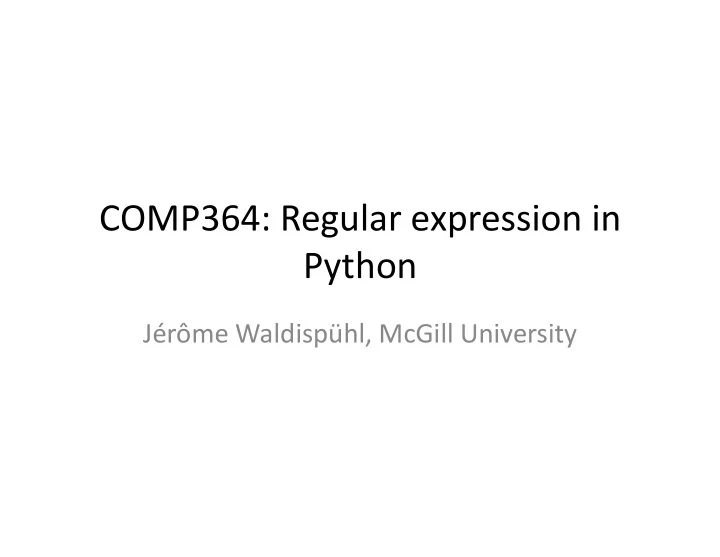

COMP364: ¡Regular ¡expression ¡in ¡ Python ¡ Jérôme ¡Waldispühl, ¡McGill ¡University ¡
DefiniHon ¡ A ¡regular ¡expression ¡(a.k.a. ¡Regexp) ¡is ¡a ¡specific ¡paNern ¡that ¡ provides ¡concise ¡and ¡flexible ¡means ¡to ¡ "match" ¡(specify ¡and ¡recognize) ¡strings ¡of ¡text, ¡ such ¡as ¡parHcular ¡characters, ¡words, ¡or ¡paNerns ¡ of ¡characters. ¡ Examples: ¡ • Words ¡containing ¡the ¡word ¡“abc” ¡ • Words ¡starHng ¡with ¡a ¡capital ¡leNer ¡ • Words ¡ending ¡with ¡a ¡number ¡
Syntax ¡of ¡Regexp ¡ Regexp ¡follows ¡the ¡syntax: ¡<regexp ¡1><regexp ¡2>…<regexp ¡N> ¡ Where ¡<regexp ¡i> ¡is ¡a ¡set ¡of ¡characters ¡that ¡can ¡be ¡iterated ¡a ¡ predefined ¡number ¡of ¡Hmes. ¡ Note: ¡Typically, ¡a ¡set ¡is ¡represented ¡between ¡brackets. ¡An ¡ undefined ¡number ¡of ¡iteraHons ¡is ¡indicated ¡by ¡“*” ¡(eventually ¡ null) ¡or ¡by ¡“+” ¡(strictly ¡posiHve). ¡ Examples: ¡ • ¡[0-‑9]+ ¡// ¡sequence ¡of ¡integers ¡ • ¡[A-‑Z][a-‑z]* ¡// ¡words ¡starHng ¡with ¡a ¡capital ¡leNer ¡
Syntax ¡of ¡regexp ¡in ¡Python ¡ ‘ ¡. ¡’ ¡ ¡: ¡Anything ¡ ‘ ¡* ¡‘ ¡: ¡0 ¡or ¡more ¡repeHHons ¡ ‘ ¡^ ¡‘ ¡: ¡Start ¡of ¡the ¡string ¡ ‘ ¡+ ¡‘ ¡: ¡1 ¡or ¡more ¡repeHHons ¡ ‘ ¡$ ¡‘ ¡: ¡End ¡of ¡a ¡string ¡ ‘ ¡? ¡‘ ¡: ¡0 ¡or ¡1 ¡repeHHon ¡ ‘[]’ ¡ ¡: ¡A ¡set ¡of ¡characters ¡ ‘{m,n}’ ¡: ¡ m ¡to ¡ n ¡copies ¡ ‘[^…]’ ¡ ¡: ¡NegaHve ¡set ¡ ‘ ¡| ¡‘ ¡: ¡Or ¡ ‘()’ ¡ ¡: ¡Match ¡the ¡regexp ¡inside ¡ ‘ ¡\ ¡’ ¡: ¡Special ¡charaters ¡ ‘\d’ ¡: ¡Digit ¡(i.e. ¡[0-‑9]) ¡ ‘\D’ ¡: ¡Nt ¡a ¡digit ¡(i.e. ¡[~0-‑9]) ¡ ¡ ‘\s’ ¡ ¡: ¡Whitespaces ¡(i.e. ¡[ ¡\t\n\r\f\v]) ¡ ‘\S’ ¡ ¡: ¡Non-‑whitespaces ¡(i.e. ¡[^ ¡\t\n\r\f\v]) ¡ ’\w’: ¡Alphanumeric ¡(i.e. ¡[a-‑zA-‑Z0-‑9_]) ¡ ‘\W’: ¡Non-‑alpha ¡numeric ¡(i.e. ¡[^a-‑zA-‑Z0-‑9_]) ¡
Examples ¡ What ¡is ¡this ¡regexp ¡represent? ¡ ^M([AC-GIK-MP-TVWYZ]+)$ The ¡same ¡but ¡with ¡at ¡least ¡20 ¡amino ¡acids? ¡ ¡ ^M([AC-GIK-MP-TVWYZ]{20}) ¡ ([AC-GIK-MP-TVWYZ]+)$ ¡ ¡
Module ¡re ¡ Ini=aliza=on: ¡ Regexp ¡module ¡is ¡named ¡“ re ” ¡ Start ¡your ¡script ¡with ¡ import re Crea=on ¡of ¡a ¡regexp: pattern = re.compile(<regexp>) ¡ Match ¡regexp ¡to ¡a ¡string: ¡ result = pattern.match(<string>) Shortcut: ¡ result = re.match(<regexp>,<string>)
TesHng ¡regexp ¡ if re.match(<regexp>,<string>): print “Regexp matches string ” ¡ Exercise: ¡ Write ¡a ¡script ¡that ¡checks ¡if ¡a ¡string ¡(given ¡in ¡the ¡command ¡ line) ¡follows ¡the ¡ ¡
Capturing ¡elements ¡ .group() : ¡returns ¡the ¡group ¡of ¡matched ¡expressions. Provide ¡an ¡argument ¡ i ¡ if ¡you ¡want ¡a ¡specific ¡subgroup. ¡ #!/usr/bin/python import re line = "cats are smarter than dogs"; matchObj = re.match( '(.*) are (.*)', line) if matchObj: print "matchObj.group() : ", matchObj.group() print "matchObj.group(1) : ", matchObj.group(1) print "matchObj.group(2) : ", matchObj.group(2) else: print "No match!!"
Search ¡vs. ¡match ¡ match() tries ¡to ¡match ¡the ¡string ¡from ¡the ¡beginning, ¡ search() checks ¡for ¡a ¡match ¡anywhere ¡in ¡the ¡string. ¡ ¡ #!/usr/bin/python import re line = “cats are smarter than dogs"; matchObj = re.match( 'dogs', line) if matchObj: print "match --> matchObj.group() : ", matchObj.group() else: print "No match!!" matchObj = re.search( 'dogs', line) if matchObj: print "search --> matchObj.group() : ", matchObj.group() else: print "No match!!"
.match() ¡ match() tries ¡to ¡match ¡the ¡string ¡from ¡the ¡beginning ¡ #!/usr/bin/python import re line = "cats are smarter than dogs"; matchObj = re.match( '(.*) are (\d*)', line) if matchObj: print "matchObj.group() : ", matchObj.group() print "matchObj.group(1) : ", matchObj.group(1) print "matchObj.group(2) : ", matchObj.group(2) else: print "No match!!"
ApplicaHons ¡ • ¡MoHf ¡finding ¡ • ¡PROSITE ¡ • ¡Parse ¡files ¡ Problem ¡of ¡the ¡assignment: ¡ • ¡Write ¡a ¡regular ¡expression ¡that ¡describes ¡a ¡mature ¡mRNA ¡ surrounded ¡by ¡START ¡and ¡STOP ¡codons. ¡ • ¡Write ¡a ¡script ¡that: ¡ o ¡idenHfy ¡if ¡ ¡sequence ¡contains ¡a ¡mature ¡mRNA, ¡ o ¡returns ¡the ¡coding ¡sequence ¡(without ¡START ¡and ¡ STOP ¡codons). ¡
Recommend
More recommend